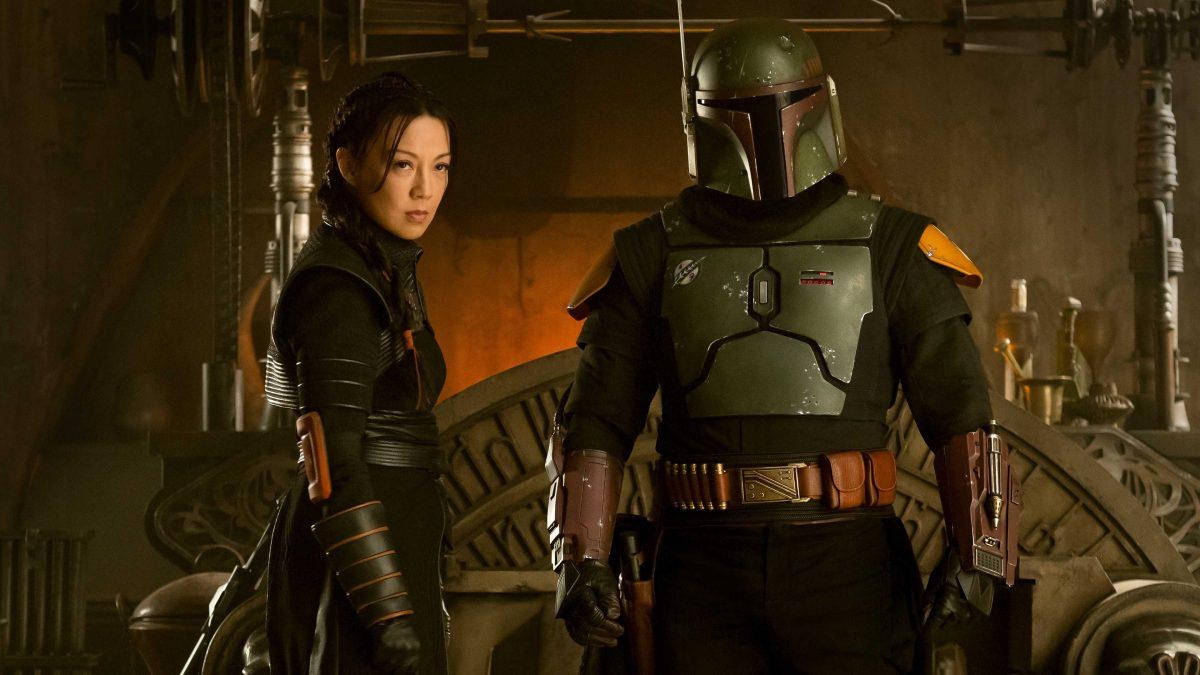First introduced in “The Empire Strikes Back” in 1980, the character of Boba Fett, initially played by the late Jeremy Bulloch, has always been a favorite among “Star Wars” fans since his introduction. I considered the character to be innately cool, just like every other fan. His dented armor and ominous presence oozed an aura of mysticism that’s pretty unparalleled in this franchise, apart from maybe Vader, another scary helmet villain. Unfortunately, the character rarely got his due with only four lines of dialogue, nearly six minutes of actual screen time in the original trilogy, and a younger version that did next to nothing in the prequels. Thus, it was only fitting that the beskar-clad bounty hunter got his own show.
Enter “The Book of Boba Fett.” Or should I say “The Mandalorian” season 2.5?
It breaks my heart to say that Boba Fett cannot carry a show on his own because the best episode(s) were ones that barely or did not feature the titular character at all—opting to showcase (spoilers) Pedro Pascal’s fan-favorite Din Djarin from “The Mandalorian” instead. The series itself is described as a crime drama but barely feels like one due to the vast majority of the show being told through flashbacks. I viewed it essentially as a galactic redemption story with an almost biblical, flashback-driven narrative.
To clarify, they make the show out to be like a story from The Bible, giving a picturesque & detailed insight into how this warrior survived the Sarlacc Pit and transformed into the character we met in the last season of “Mando.” This comparison might be a stretch, but it felt like the story of Paul, an apostle of Jesus, who was formerly Saul, a persecutor that became blind and then converted to Christianity. Granted, there is no God or any deity to be found, but his metamorphosis from a notorious killer to a “simple man just trying to make his way through the galaxy” is evident enough.
I suppose my major problem with this series is that it just isn’t all that eventful. Yes, viewers see lots of Boba, especially compared to his original screen time, but, barring episodes five & six, most of the episodes left me feeling relatively empty, as if I just ate a bag of potato chips. The finale was also incredibly underwhelming, with it being just a big shootout. It was great at the moment but quite unfulfilling in the end.
I wish the series could’ve been about all of his non-canon lore and badass bounty hunting, but that simply isn’t going to cut it for a family entertainment company like Disney. It’s going to position Fett as a hero to root for.
At the very least, “The Book of Boba Fett” provides fans of the character with a bit of humanity of the infamous bounty hunter under the helmet. It gives the T-visor a human face and a detailed, albeit flashback-riddled, backstory. Plus, Temuera Morrison completely commands the screen and owns the role of Boba Fett. He’s pretty incredible.
Additionally, I found some of the cameos to be quite troubling. It was nice to see certain characters again, but I don’t think the deep fake CGI tech utilized in episode six should be implemented anymore. There are far better creative solutions than digitally showcasing a young character again. Their presence worked for the story, but how the presentation and their implications for the future of film are where I find significant issues with it.
In all honesty, “The Book of Boba Fett” was mid. The bland cinematography (not the last three episodes), lack of progressive storytelling (not the last three episodes), & flashback reliance (again, not the last three episodes) are what killed the series for me, even if I was entertained. Hopefully, the following “Book” will give Boba Fett a better showcase where other prominent characters won’t overshadow him.
‘The Book of Boba Fett’ patches holes in the story’s armor, but is shot down by a middling story
February 17, 2022
Book of Boba Fett





